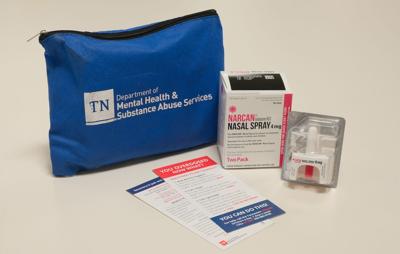
An opioid overdose reversal kit distributed by regional overdose prevention specialists
Last week, Davidson County regional overdose prevention specialist Jeremy Reese and his colleagues started to add fentanyl test strips to the opioid overdose reversal kits they distribute to individuals and nonprofits.
Until earlier this year, the test strips were considered drug paraphernalia in Tennessee, limiting their availability. In March, the state legislature passed a law excluding the test strips from the paraphernalia definition, and the Tennessee Department of Mental Health and Substance Abuse Services then purchased 33,000 to distribute statewide.
The Metro Public Health Department reported 712 suspected drug overdose deaths in Davidson County in 2021, up 15 percent from 2020, which was previously the deadliest year on record. Fentanyl was found in 74 percent of overdose-related toxicology reports. The data does not include how many doses of naloxone, the overdose reversal drug commonly known by one of its brand names Narcan, were given.
The test strips will be distributed both individually and coupled with naloxone, Reese says.
“Our goal is hopefully that somebody wouldn't have to use Narcan,” Reese says. “If the strips are there too, they're like, 'OK, well, we have strips. Well, let's test it.' Maybe the Narcan never has to get used because they have the fentanyl test strips.”
This year, the Tennessee Department of Mental Health and Substance Abuse Services also started a pilot program to equip law enforcement and first responders with naloxone kits to leave in homes where they have responded to overdose calls.
Still, the state is strategic in the way it distributes naloxone. Reese, who works under the state-contracted STARS program, is trained not to leave it sitting out for the taking. In order to obtain free naloxone in Davidson County, one must fall into one of three categories: someone who can’t afford it, someone who is an immediate risk or close to someone who is an immediate risk for overdose, or someone who receives it through a nonprofit. Reese and his counterparts also do street outreach at homeless encampments.
Anthony Jackson, director of prevention and early intervention services for the Department of Mental Health and Substance Abuse Services, says the organization looks at overdose prevention pragmatically, focusing on individuals at high risk and who are actively using drugs. Jackson says it is important to prioritize distribution to “people who are high risk who actively use substances [and] would not have another means by which to access” naloxone.
In July, a state law went into effect requiring providers to offer naloxone when prescribing an opioid.
For the general public, many pharmacies have a standing order for naloxone, and the state recommends people try to obtain it via their insurance before requesting it from local organizations. Without insurance, it can cost up to $150, and Reese notes that sometimes pharmacies do not carry it.
“We take a holistic approach to all this,” Jackson says. “Yes, getting naloxone in people's hands is very important. But in addition to that, it's about getting people resources, access to other services and other supports they need.”
This article first ran via the Scene's sister publication, the Nashville Post.






